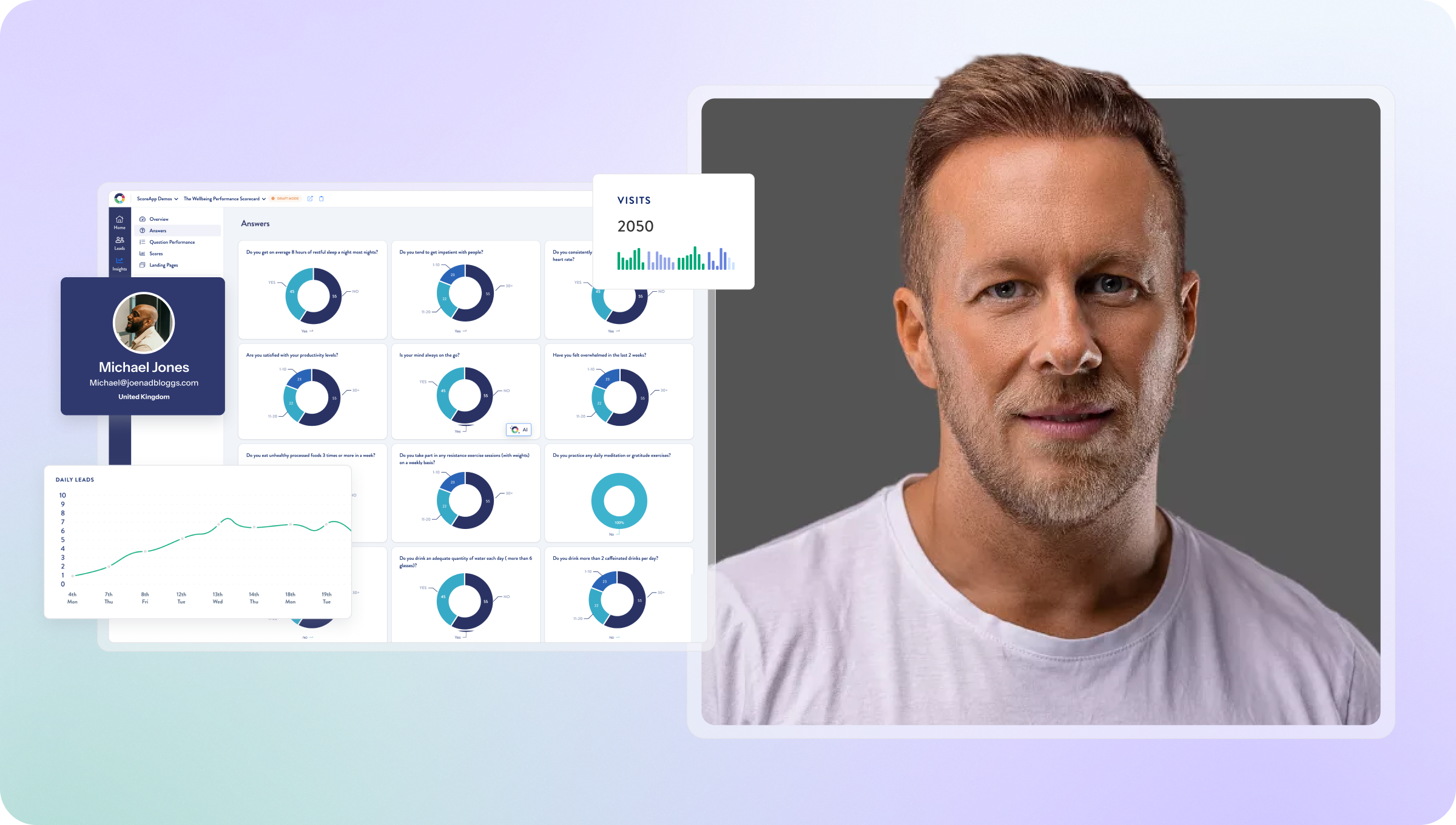What Are the Best Recruitment Assessment Tools for Hiring Success?


Hiring the right people isn’t as simple as posting a job ad and waiting for the perfect candidate to show up. With competition for top talent at an all-time high, you need smarter, more reliable ways to find the best fit—fast.
That’s where recruitment assessment tools come in. Whether it’s skills tests or psychometric evaluations, the right tools can help recruiters make better, data-driven hiring decisions. Instead of relying on guesswork, you get real insights into who’s actually right for the role.
In this blog post, we’ll take a look at some of the best recruitment assessment tools out there, what to keep in mind when picking one, and how ScoreApp makes it super easy to create custom assessments that actually work for your hiring process.
Why use recruitment assessment tools?

Recruitment assessment tools are a game-changer for modern hiring. They take the stress (and guesswork) out of finding the right people for your team. Here’s how they help:
- Make better hiring decisions: No more hiring based on hunches. These tools give you objective data to confidently choose candidates who are right for the role.
- Save loads of time: Skip the endless CV-sifting. Smart assessment tools automatically highlight your top candidates so you can focus on the best ones, faster.
- Give candidates a better experience: A clear, well-designed assessment process shows candidates you’ve got your act together. It feels fair, structured, and makes a great first impression.
- Cut down on hiring costs: Bad hires are expensive. With better insights upfront, you’re way less likely to end up rehiring in a few months.
Recruitment assessment tools help you hire smarter, quicker, and with way more confidence. What’s not to love?
6 types of recruitment assessment tools and their roles in hiring (with examples)

Recruitment assessment tools are designed to measure different things. From testing technical skills to understanding how someone thinks or behaves in a team, these tools help you get a complete picture of each candidate.
The key is knowing which tool to use and when. Here’s a breakdown of six common categories of assessments, what they’re best at, and an example of how you might use it in your hiring process.
1. Skills assessment tools
These are all about testing whether candidates can actually do the job you’re hiring them for. Instead of relying on a polished CV or interview chat, skills assessments give you real evidence of their abilities—whether that’s technical know-how or task-specific skills.
Example: For a marketing role, you could ask candidates to write a short email campaign or plan a basic content strategy. For a coding position, a timed coding challenge might reveal how well they handle real-world tasks.
2. Cognitive ability tests
These tests help you understand how someone thinks. They measure things such as problem-solving, logical reasoning, and how quickly a candidate can learn new information. This is super helpful when you’re hiring for roles where adaptability and brainpower matter more than experience.
Example: A numerical reasoning test might show how well a candidate can interpret data, but a pattern recognition task could help spot fast learners who’ll pick up systems quickly. It all depends on the demands of the job.
3. Personality and behavioral assessments
Personality tests go beyond skills and look at who someone is and how they’re likely to behave at work. They can help predict whether a candidate will thrive in your company culture, work well with others, or take on a leadership role in the future.
Example: A test such as The Big Five or DISC can help you understand if someone is naturally collaborative, detail-oriented, or a big-picture thinker, which is insightful when building a well-balanced team.
4. Situational judgment tests (SJTs)
These put candidates in realistic work situations and ask how they’d respond. You get a glimpse of their judgment, values, and soft skills in action—like empathy, communication, and decision-making.
Example: For a team leader role, an SJT might ask how they’d handle a conflict between two team members, showing whether they stay calm, fair, and solution-focused under pressure.
5. Psychometric tests
Psychometric tests explore a candidate’s natural abilities and tendencies—how they think, what motivates them, and how they’re likely to perform under different conditions. These are great for uncovering hidden strengths and potential.
Example: An aptitude test might show how someone processes information or makes decisions, helping you match the right person to the right kind of role, even if they haven’t held it before.
6. Video interview and AI assessment tools
These tools let candidates record their answers to interview questions on video, often supported by AI that analyzes everything from communication style to confidence levels. They help you spot standout candidates early, which is especially useful when you’re dealing with a high volume of applications.
Example: You might ask a candidate to introduce themselves and explain why they’re interested in the role. The tool can flag candidates who come across as enthusiastic, articulate, and aligned with your brand voice.
What to look for in a recruitment assessment tool

Not all assessment tools are created equal. The best ones don’t just give you results—they make your hiring process smoother, smarter, and more candidate-friendly.
They’re also an investment you need to justify, so you need to be sure you’re getting the right recruitment assessment tool for your business.
Here are the key features to look for:
- Customizability: Look for tools that let you tailor assessments to fit roles, industries, or seniority levels. This ensures you’re evaluating candidates on the competencies that matter most for each position. One size doesn’t fit all, and your hiring tool should reflect that.
- Automated scoring and reporting: The best tools save you time by instantly scoring assessments and giving you clear, easy-to-read reports. That means faster decisions and fewer bottlenecks.
- Seamless integrations: Your assessment tool should play nicely with your systems, such as your applicant tracking system (ATS) or HR software, to create a cohesive recruitment workflow.
- Engaging user experience: A clunky or confusing test can put candidates off. Great tools are intuitive, clear, and even enjoyable to complete—and earn you instant brownie points!
- Data security and compliance: Make sure the tool meets GDPR and other data privacy standards. Protecting candidate information is an essential, not an option.
Choosing the right tool is about more than just features—it’s about finding something that works for your team and creates a positive experience for every candidate.
Selecting a recruitment assessment tool with these features will help you make more informed hiring decisions, improve efficiency, and provide a better experience for both recruiters and candidates.
Comparison of the best recruitment assessment tools

Here are a few examples of well-known recruitment assessment tools. We’ve categorized them into types of platforms, to make it easier to compare like for like.
Traditional recruitment assessment platforms
Traditional recruitment assessment platforms have been around for years and are often seen as the go-to solutions for large-scale, standardized hiring processes. These platforms typically focus on scientifically validated testing methods and are widely used by enterprise-level companies to assess everything from cognitive ability to personality and job-specific skills.
While newer tools may offer more flexibility or visual appeal, traditional platforms stand out for their depth of research, reliability, and comprehensive assessment libraries.
Here are three of the best-known names in this space:
SHL
USPs: Psychometric accuracy, large-scale benchmarking, global reach
A global leader in talent assessment, SHL is known for its science-backed psychometric tests and predictive analytics. It offers a wide range of assessments for cognitive ability, personality, and situational judgment. Its main strength lies in benchmarking talent against a global dataset, helping large companies make high-stakes hiring and leadership decisions confidently.
Criteria
USPs: Candidate experience, validity, and ease of use for growing teams
Criteria provides a broad range of assessments, from aptitude and personality tests to skills testing and video interviews. What sets it apart is its focus on fairness and candidate-friendly design, backed by industrial and organizational (I/O) psychology. It’s especially popular with mid-sized businesses that want reliable insights without overwhelming complexity.
Wonderlic
USPs: Fast cognitive testing, predictive hiring data, strong brand recognition
Best known for its cognitive ability test (famously used in the NFL Draft), Wonderlic focuses on measuring problem-solving, learning ability, and workplace potential. It’s designed to be quick, predictive, and scalable—ideal for roles where speed and accuracy in decision-making are key.
These platforms are trusted by thousands of organizations worldwide and are often chosen for their scientific credibility and robust data. But they may come with less flexibility or customization compared to newer, more agile tools.
AI-driven assessments
AI-driven assessment tools use artificial intelligence to bring a new level of speed, insight, and personalization to the hiring process. These platforms go beyond traditional tests by analyzing patterns in behavior, communication, and decision-making—often in real time. They’re particularly useful for companies looking to scale hiring, reduce bias, and tap into deeper predictive analytics.
While still grounded in validated science, AI-driven tools are built to be dynamic and adaptive, helping hiring teams move faster while improving candidate insights.
Here are two leaders in the space:
HireVue
USPs: AI-powered video interviews, game-based testing, fast screening at scale
One of the pioneers in video interview analysis, HireVue uses AI to assess candidates’ verbal and non-verbal communication, word choice, and tone during pre-recorded video interviews. It also offers game-based assessments to evaluate cognitive and emotional traits. HireVue is popular with enterprise-level companies looking to streamline high-volume hiring and reduce time to hire.
Pymetrics
USPs: Neuroscience games, soft skill profiling, fairness-focused AI
Pymetrics uses neuroscience-based games and AI to assess a candidate’s cognitive and emotional traits, such as risk tolerance, attention, and memory. Its standout feature is its focus on fairness and bias reduction, using algorithms that are regularly audited for ethical hiring. It’s a great fit for companies focused on values-based hiring and potential, rather than just experience.
AI-driven tools are gaining momentum for good reason—they offer smart, scalable ways to understand candidates beyond the CV. But it’s important to choose platforms with transparent AI and strong ethical standards to ensure a fair and inclusive hiring process.
Behavioral and psychometric assessments
Behavioral and psychometric assessments are designed to measure the traits that drive how people think, work, and interact with others. Unlike skills-based or cognitive tests, these tools focus on personality, motivation, and workplace behavior, giving you a clearer view of how someone is likely to fit within your company culture.
These assessments are especially valuable when hiring for leadership roles, building teams, or trying to reduce turnover. They can reveal hidden strengths, identify potential risks, and help match candidates to roles where they’re most likely to thrive. Here are two well-known platforms in this space:
Hogan Assessments
USPs: Deep personality insights, risk prediction, leadership profiling
Hogan is a global leader in personality assessments, used widely for leadership development and high-stakes hiring.
It measures:
- Day-to-day personality: How people typically behave
- Potential derailers: What might go wrong under pressure
- Values: What drives someone’s decisions
Hogan’s tools are deeply rooted in research and are trusted by Fortune 500 companies.
The Predictive Index (PI)
USPs: Fast behavioral insights, team fit analysis, strategic talent alignment
The Predictive Index (PI) offers behavioral and cognitive assessments that help businesses understand how candidates work, communicate, and interact with others.
Its behavioral assessment is simple and quick, often taking under 10 minutes, but delivers powerful data on work style, team dynamics, and role fit. PI is especially useful for aligning hiring with company strategy and team goals.
Behavioral and psychometric tools give you a deeper layer of understanding, ensuring the people you hire are not just capable, but also motivated, culturally aligned, and likely to succeed long term.
Customizable and lead-generating assessments
Some assessment tools go beyond hiring—they help attract talent in the first place. Customizable and lead-generating assessments are designed to act as both a recruitment filter and a powerful marketing tool. These platforms let you build branded quizzes or scorecards that showcase your employer brand, engage potential candidates, and gather valuable insights before the interview stage even begins.
They’re especially useful for companies that want to create a more dynamic, human-centered candidate journey, or for growing businesses that want to identify top talent while building a pipeline of future applicants.
ScoreApp
USPs: Fully branded assessments, lead capture, engaging candidate experience, smart scoring, and instant feedback
ScoreApp makes it easy to build beautiful, branded assessments that not only evaluate candidates but also generate leads and interest. With custom questions, smart scoring, and instant feedback, it turns the typical ‘apply now’ into something far more interactive.
It’s perfect if you want to attract self-selecting candidates who are already excited about the role—and if you want to stand out in a competitive market.
Why choose ScoreApp?

If you’re looking for a tool that feels more like marketing than HR—while giving you useful candidate data—ScoreApp offers a fresh, strategic approach to hiring.
- Fully customizable templates for role-specific assessments
ScoreApp gives you the freedom to create tailored assessments that align perfectly with the roles you’re hiring for. Whether it’s a sales position, creative role, or technical job, you can design scorecards with custom questions, branding, and logic that reflect exactly what you’re looking for in a candidate. - Real-time analytics to track candidate performance
Instantly see how candidates score across areas with real-time dashboards and insights. You can quickly identify top performers, spot trends in candidate responses, and use the data to make faster, more informed hiring decisions. - Seamless lead generation for passive talent pools
ScoreApp doesn’t just assess candidates—it attracts them. Use quizzes and scorecards as lead magnets to engage potential candidates who aren’t actively job hunting. You’ll build a pool of qualified, interested talent you can tap into when new roles open up. - Simple and intuitive design for candidates and recruiters
The platform is built for ease of use. Candidates enjoy a smooth, engaging experience that feels more like an interactive quiz than a traditional assessment. And recruiters get a clean, user-friendly dashboard to manage results without tech headaches.
ScoreApp is a smart choice if you want to stand out, stream your hiring, and connect with great people before your competitors do.
Find the right assessment tool for your hiring needs
Choosing the right recruitment assessment tool is essential for hiring success. Whether you need a basic skills test to screen for technical abilities or a comprehensive behavioral evaluation to understand a candidate’s personality and cultural fit, the right tool can make all the difference.
A well-selected assessment platform will not only help you find top talent but also retain it by ensuring you’re hiring individuals who are aligned with the roles and your company’s values.
If you’re ready to take your hiring process to the next level, try ScoreApp for free and start building better candidate assessments today.



